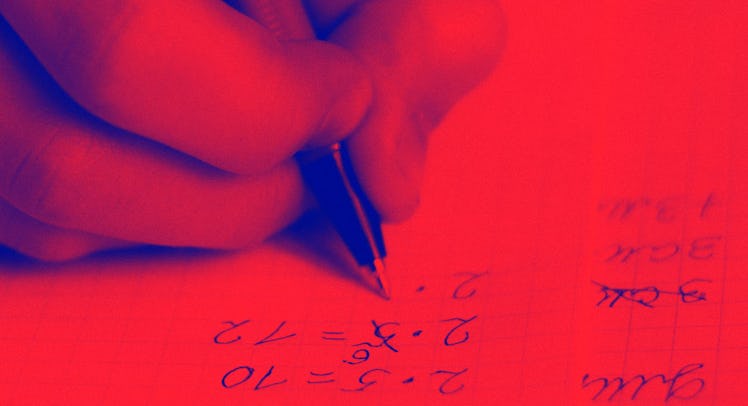This Test Predicts Whether Your Kid Will Be Good at Math
Is your kid on track to dive into algorithms like a junior Bill Gates? This test will tell you.

Math may not be your strong suit but, considering the way the world is going, you’re probably banking on your kids acing algebra. Fortunately, there are many ways parents can encourage their children to embrace mathematics. Studies suggest that dads who hate math raise kids who feel similarly hostile toward fractions and that kids are more likely to dive into equations if their parents solve number problems in their spare time, just for fun (try not to get too excited).
But wouldn’t it be nice to be able to run a quick test on your kid right now, and determine whether he or she is on track to dive into algorithms and become the next Bill Gates? We’ve got you covered. Researchers recently published a battery of tests that parents can administer to their first graders, which have been shown to predict math success up to one year later.
Meet The “Order Tests”
First, answer the following eight questions about your child by assigning each statement a score ranging from 1 (very much disagree) to 7 (very much agree). Next, add up your score from questions 2, 3, 4, and 7, and then subtract the sum of questions 1, 5, and 8 from the total (isn’t math just terrible?). A perfect score — and a harbinger of budding math genius — is 25.
My son/daughter:
- Is easily confused by changes in routine
- Understands how the seasons of the year follow each other
- Can easily recall the order in which past events happened
- Is able to plan a sequence of activities independently
- Finds it difficult to learn new activities that involve a sequence of actions which have to be performed in a particular order (putting together the parts of a toy in the right order)
- Would be able to recall the order of typical daily events
- Understands that some things always have to be done in a particular order
- Finds it difficult to understand how the days of the week follow each other
Alas, parents tend to be biased when assessing their own children. So there are a few other tests available that force our kids to show us their pre-mathematical mettle. Try this: draw up six note cards (or find images online) of a child waking up, getting dressed, going to school, eating lunch, eating dinner, and going to bed. Show your child these images and explain the order in which they happen. Then, ask your child to place any three of them in the correct order. If your child gets it right most of the time, that’s another strong sign of future math ability.
Finally, a straightforward test — ask your child to count as high as he or she can (no need to go higher than 50). Then, instruct your kid to count backward from that number until 1. Next, pick a random number within that range and ask them to start counting upwards from there. And then reverse it. If your child is fairly comfortable with this exercise, that’s another very good sign.
How Do These (Seemingly Non-Mathematical) Tests Work?
Not all kids are great with numbers at first, and just because your five-year-old can’t count doesn’t mean he or she is missing the raw materials for math greatness. Math, it turns out, is more about order than it is about memorizing rules and stumbling through word problems.
“Our detailed analyses of the components of the formal maths tests also showed that ordinality was important to all aspects of maths, including counting, calculation, and the understanding of number facts and measures,” according to the scientists who designed these tests. “Even at the very earliest stages of formal schooling, children’s general ability to process order as demonstrated in familiar everyday tasks and to a lesser extent, their ability to order daily events, plays an important role in the successful development of more mature maths skills.”
In other words, a five-year-old who understands how to place events and pictures in the right order is likely to succeed in math. Because all that child needs is someone to explain how numbers should be arranged. The raw ability to arrange discrete variables is already there.
My Kid Isn’t Good At Any Of This Stuff. Help!
First of all, don’t panic. These tests are usually conducted under laboratory conditions, and there’s always the possibility that your kid counts just fine when you’re not breathing down his back, or sorts daily tasks perfectly well when they’re not crudely scrawled on notecards.
But if you suspect that your child’s math and order issues run deeper than that, it’s possible that he or she is suffering from developmental dyscalculia — a disorder characterized by difficulties in the retrieval and storage of arithmetic facts. Preliminary treatments for dyscalculia are available, and resemble methods used to teach children with general learning disabilities. If you think that your child may have dyscalculia, or any learning disability, speak with your doctor.
In most cases, however, poor math skills tend to have less to do with lack of ability and more to do with lack of interest. Try showing your children that numbers and order-based tasks can be fun, and take a genuine interest in their mathematical ventures. As Anitra Jackson, a Montessori school teacher, once told Fatherly, “you have to do math and read every day.” Good luck.
This article was originally published on